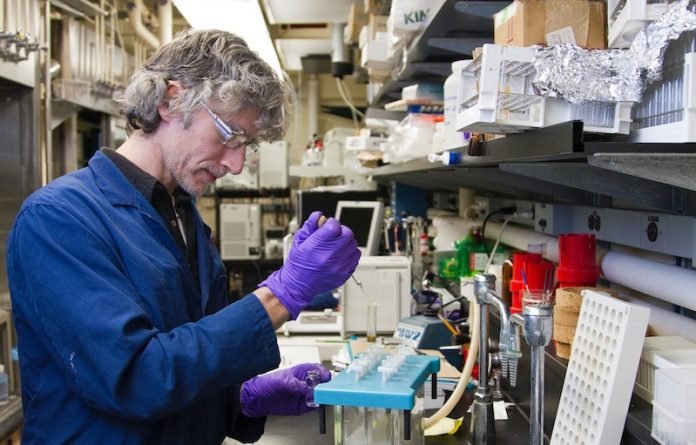
Prostate cancer is notorious for eventually developing resistance to standard treatments that block or reduce testosterone, which fuels the growth of these tumors.
In a study from Washington University in St. Louis, scientists found a single drug compound simultaneously attacks hard-to-treat prostate cancer on several fronts.
It triggers immune cells to attack, helps the immune cells penetrate the tumor, and cuts off the tumor’s ability to burn testosterone as fuel.
The drug may offer a promising new strategy for treating patients whose tumors don’t respond to standard therapy.
Prostate cancer has proven stubbornly resistant to newer immunotherapies, which are intended to take the brakes off the immune system’s T cells to get them fighting cancerous invaders.
Immunotherapies—most commonly, immune checkpoint inhibitors—can be extremely effective but only in certain cancers, such as melanoma.
In the study, the drug, called (R)-9b, is a small molecule that blocks an oncogene, a gene that drives cancer.
The researchers initially attributed the drug’s success in mouse studies to its ability to reduce or eliminate androgen receptors in prostate cancer cells.
These receptors bind to testosterone and use the hormone to fuel tumor growth.
The drug’s ability to eliminate the androgen receptor differs from standard drugs that reduce the amount of testosterone in the body, and other drugs that block the androgen receptor’s function as a transcription regulator.
But because the new drug was so effective, the team suspected something more was going on. The drug blocks a gene called ACK1.
The team found the new drug took the brakes off the immune system and produced increased levels of certain types of T cells known to attack cancer.
The drug also increased signaling molecules that allow the T cells to penetrate the tumor and kill cancer cells more effectively. The tumors in these (R)-9b treated mice were much smaller than those of mice in control groups.
The team said the drug spurs multiple responses because of the nature of the gene it blocks.
Many genes have several roles in the body, and ACK1’s roles in the expression of the androgen receptor and in reigning in the immune system make it an appealing target for cancer therapy, especially against solid tumors with a hormonal growth component, such as prostate and breast cancers.
The team has worked with Washington University’s Office of Technology Management/Tech Transfer to file patents on the use of this drug in cancer treatment.
If you care about prostate cancer, please read studies about the cause of spread of prostate cancer, and scientists find the cause of prostate cancer metastasis.
For more information about cancer, please read studies that low-carb diet could increase overall cancer risk, and vitamin D supplements strongly reduces cancer death.
The study was conducted by Nupam P. Mahajan et al and published in Nature Communications.
Copyright © 2022 Knowridge Science Report. All rights reserved.



